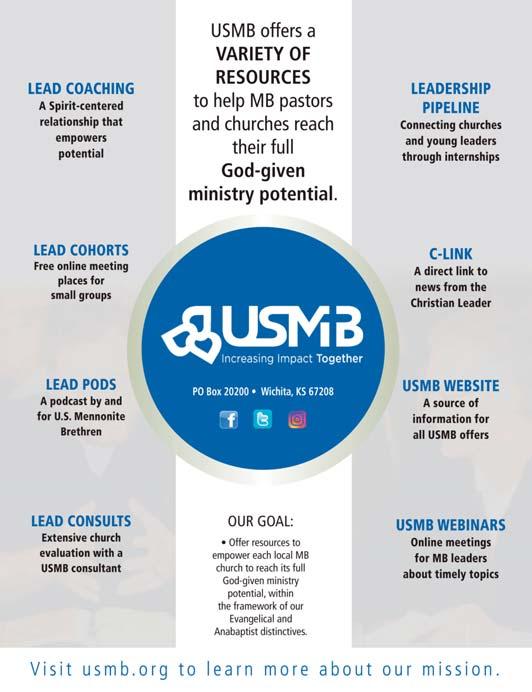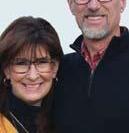

When
“peacemaking” is used as a verb, it communicates that creating, building and producing peace involves action.
Ask, listen, chew
Peacemaking requires action, determination



When
“peacemaking” is used as a verb, it communicates that creating, building and producing peace involves action.
Peacemaking requires action, determination
Christian Leader news articles involves asking questions. Most of the time, questions about a ministry or event begin with words like who, what, where, when, why and how, and the answers are typically straightforward. But other times, questions can be more difficult to answer.
In this issue we introduce a new standing column, “Got Questions” by veteran columnist Caitlin Friesen (pg. 19). In each issue, Friesen anticipates addressing the kind of questions that “require prayerful consideration, deeper conversation and a willingness to come to a different conclusion than what was expected.”
I think questions can play an important role in facilitating peace, the theme of the feature articles in this issue. There are many topics on which Christians disagree. How do we respond wisely when we disagree with a fellow believer? How do we respond to another believer who holds so strongly to his or her convictions that there is no room for discussion? How do we navigate a relationship with another believer who views as secondary something that is of primary importance to us? Does seeking harmony and unity require us to compromise our understanding of obedience to Jesus?
While some may have answers to these questions, living out those answers is not easy. But we have a foundational starting point. In our “Around the World” column (pg. 9), Paul Dück writes about the challenge Mennonite Brethren in Brazil faced after merging two conferences with different cultures, theology and practice into one national conference. Dück says that the two groups agreed to “recognize Christ in one another.”
We take an important step toward peace when we express God’s love for us by seeing Jesus in our Christian brothers and sisters, despite our differences. When we see Christ in one another, we acknowledge the value of others and are willing to learn from each other. And key to this is asking questions, listening to the responses and then chewing on what we’ve heard.
When “peacemaking” is used as a verb, it communicates that creating, building and producing peace involves action. To make something requires both action and determination. I’m reminded of the phrase from a well-known hymn, “I have decided to follow Jesus.” Our faith journey is filled with choices. Beyond our initial decision to become a disciple of Jesus to which this song alludes, we also make daily choices to follow Jesus as peacemakers. Peace doesn’t just happen. We decide to ask questions and engage with a fellow believer with whom we disagree. We decide to be “peacemakers and agents of reconciliation in families, churches, communities, in our nation and throughout the world,” as stated in Article 13 of our Confession of Faith. Our hope is that the articles in this issue will inspire you to commit to being an active peacemaker.
Ten years ago when U.S. Mennonite Brethren revised Article 13 of our Confession of Faith, the Board of Faith and Life published a fourpart study on peacemaking that is available via a link at the end of this editorial as posted on the CL website.
Publisher: United States Conference of Mennonite Brethren Churches/ISSN 0009-5149
Connie Faber, Editor

Editorial Committee: Matt Ehresman, Michele Fiester, Aaron Garza, Ryan Loewen, Shelly Spencer, Tony Petersen. Review Committee: Don Morris, Jordan Ringhofer, Brent Warkentin
Disclaimer: The content and viewpoints expressed do not necessarily reflect the views, beliefs and/or viewpoints of USMB as a whole.
Copyright: Articles are owned by the Christian Leader or the author and may not be reprinted without permission. Unless noted, Scripture quotations are from the New International Version.
Postmaster: Send address changes to Christian Leader, Box 155, Hillsboro, KS 67063. Periodical postage paid at Hillsboro, KS Vol. 86, No. 5 — September/October 2023
Subscriptions: $10 for six issues and $20 for 12 issues ($15, $30 in Canada, all other countries $25 for six issues); $2 per copy.
Correspondence: Christian Leader, Box 155, 107 N. Main, Hillsboro, KS 67063-0155. Phone: 620.947.5543. Email: editor@usmb.org
Membership: Evangelical Press Association and Meetinghouse
■ Don Morris, EDITOR-IN-CHIEF
■ Connie Faber, EDITOR
■ Janae Rempel, ASSOCIATE EDITOR
■ Shelley Plett, GRAPHIC DESIGNER


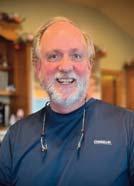



Fasting can be a meaningful act of discipleship
InJuly I asked our USMB family to join me in a dedicated 24-hour time of prayer and fasting. We collectively petitioned God to create a powerful movement among us, to use us in a meaningful way in the future. We prayed that we might be found faithful to his truth. Many joined in this time of seeking God and said they had a joyful time of fellowship with God and a sense of peace as they prayed.
It’s been said that fasting should be a “hungering after God.” In other words, it’s giving up food to spend more time with Jesus. It’s hunger for God rather than paying attention to the hunger for food. When you feel those inevitable hunger pangs, they’re just reminders to pray rather than make a sandwich. I like that.
Fasting is a meaningful part of my walk with Jesus. But I don’t do it often enough. Why? Why don’t I fast more often if it brings such peace and connection with the Lord? Why don’t we talk more about fasting in our churches and practice it on a regular basis? What prevents us from experiencing this marvelous discipline more frequently?
It’s spending more time with God to the point where we genuinely hear within our soul what God is saying to us.
I think part of our reticence to fast is simply because we don’t like to go without. I like to be comfortable, and feeling hungry isn’t comfortable. Fasting also doesn’t fit into our regular routine. There’s something about having regular meals that creates contentment. It’s out of the norm to go without food for a day or longer. It’s not all that comfy, and it takes intentionality. But aren’t those the very things that actually make fasting satisfying—being out of the norm and requiring some intentionality?
After our collective time of fasting in early July, one person wrote, “My experience was all about dialogue between me and the Holy Spirit; not a prayer just a conversation throughout the time. The Holy Spirit telling me to ride with him. Thank you, Lord, for the moment.”
As we led up to this corporate time of fasting and prayer, we stressed that fasting is not about forcing God to do something for us. It’s not asking for a list of things we want. It’s spending more time with God to the point where we genuinely hear within our soul what God is saying to us. It can even be about seeking God to use us and to make himself known through us.
It becomes about who God is and not about what we think we need. Fasting can be a corporate endeavor or something we do alone. It’s not to be trumpeted, something we brag about. We simply enjoy the uniqueness of its wonderful effect on us as we encounter Jesus in an extraordinary way.
Another person said this about fasting: “Before the fast I was distracted and burdened with a handful of situations and opportunities, and after the fast I was much more peaceful and trusting of God's guidance and provision, and also surprisingly encouraged as a result.”
From distracted and burdened to peaceful and encouraged. Hmmm. I think fasting is something quite valuable to do—and often. It might even help change us to be a little more like Jesus.
Don Morris don@usmb.org

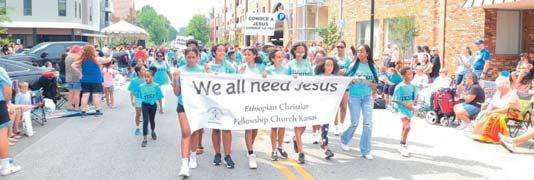




Shawnee, Kan.
Established: 1991
Southern District Conference
Attendance: 350-400
Lead Pastor: Henock Tsegaye
Our congregation in three words: Faithful, Loving, Committed
How can you pray for us?
• Pray for the grace of God to continue to be with us
• Pray for the Holy Spirit’s guidance
• Pray for us as we are planning to plant a second-generation church
Connect with us!
Website: ecfcks.org
Facebook: ECFCKS
Instagram: ECFC Kansas
YouTube: ECFCKS
Top: 2022 Johnson County Old Settler’s Day parade
Left, top: Last day of 2022 vacation Bible school
Left, middle: The mother of a church member was saved; the first convert of July.
Left, bottom: Baptism, 2022.
Compiled by Janae Rempel
When 127 Southern District Conference (SDC) pastors, delegates and guests met July 28-29 for the biennial SDC convention at Tabor College in Hillsboro, Kan., they welcomed four churches into district membership, passed a proposed bylaw revision and budget and recognized Tim Sullivan for his service as district minister.
Two churches applied for membership and were received by vote: Herold Mennonite Church, rural Bessie, Okla., and New Creation Church of Denver, Aurora, Colo., and two church plants were automatically received into membership: Ethiopian Christian Fellowship Church of Missouri, Kansas City, Mo., and SouthLife Church, Wichita, Kan.
Delegates passed a proposed bylaw revision allowing the outgoing executive chair to serve on other committees and increasing terms for the executive committee secretary and member-at-large. Delegates affirmed all nominations on the leadership ballot and passed the proposed budget of $440,276 for 2024 and $447,276 for 2025. Investment funds will be used to cover the more than $120,000 per year anticipated shortfall between revenue and expenses.

Delegates heard reports from representatives of the Church Extension and Evangelism Commission (CEEC), Faith and Life Commission, Youth Commission, Multiply, Tabor College and USMB, and attended an open house at MB Foundation to tour the agency’s new addition and a ribbon-cutting ceremony for Tabor’s newest residence hall, Jost Hall.
Henri Ngolo, USMB integrated immigrant coordinator, Liberty Township, Ohio, and Andy Owen, pastor of equipping and multiplication at Ridgepoint Church, Wichita, Kan., spoke on the theme, “See the Need, Meet the Need,” based on Proverbs 14:23.
Tim Sullivan, who plans to retire in January 2024, was honored for his service as SDC minister since July 2004. Executive Committee member Brenda Hamm, Hillsboro, summarized Sullivan’s early reports as characterized by “hope” and “together.” Fikre Norcha, pastor of Ethiopian Christian Fellowship Church of Missouri in Kansas City, Mo., and Russ Claassen, district youth minister, shared words of affirmation in person, while Stephen Humber, Multiply, shared via recording.
Musicians from the three MB churches in Hillsboro led attendees in singing.
Prior to the convention, 70 credentialed pastors and spouses gathered July 27-28. Aaron Hernandez, LAMB district minister, and his wife, Alejandra, served as speakers.—CL
USMB’s fall lineup of 13 LEAD Cohorts is slated to begin in late August or early September.
Topics include youth ministry, living with joy as pastors, contemplative conversations, discipleship, prayer, multiplying workers, sermon development and more.
LEAD Cohorts offer meeting spaces for small groups of MB pastors, leaders and anyone connected to an
MB church. Cohorts meet twice monthly for an hour via Zoom and are free with the exception of recommended reading.
For more information or to register, visit www.usmb.org/lead-cohorts or contact Janae Rempel at admin@usmb.org.—USMB
More than 230 students and staff gathered at Tabor College in Hillsboro, Kan., for the Southern District Kids Camp, June 2730. The 168 campers in attendance attended twice-daily chapel sessions and chose three activities in addition to evening all-camp activities. Alison Nikkel, Hesston, Kan., served as speaker.
“Alison did an excellent job sharing on the theme, ‘BE,’ based on selected verses from Romans 12,” says camp director J.L. Martin, Hesston (Kan.) MB Church. “Alison connected well with the campers since she has been a camper, counselor and other staff at Kids Camp, as well as a public school teacher. Her illustrations really reinforced the great teaching from the Bible.”
The Kids Camp Band led singing. High school and college students served as counselors.—CL

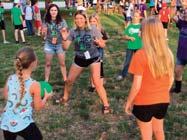

Terry Hunt will retire from his role as Eastern District Conference (EDC) minister, effective Sept. 30, 2023, after 18 years of ministry.
Hunt has served as EDC minister since September 2005. At that time, the then North Carolina District was comprised of six churches. The district has since tripled in size to encompass 18 churches in seven states, including three new churches that will join the EDC at the September 2023 convention. In 2019, the district changed its name to reflect this growth, a proposal first voted on two years prior.
“Serving the pastors and churches in the district has been a privilege and honor for me,” Hunt says. “I thank God for the opportunity and experiences I have encountered over the last 18 years. I have served on the national level representing the district since 1988. The time has come and is here for me to become more of a coach and mentor for the next generation of leaders. Change is needed so the EDC can continue growing and developing thriving churches.”
In addition to his role with the EDC, Hunt serves as lead pastor of The Life Center in Lenoir, N.C. For 17 of 31 years in ministry, Hunt held a bivocational role, also working as a plant manager in the furniture industry. He intends to continue serving as lead pastor of The Life Center.
The district executive committee is conducting a search for the new district minister.—EDC
The Central District Conference held its inaugural “Renewal and Missional Church” workshop at Community Bible Church in Mountain Lake, Minn., June 23.
Speakers featured CDC pastors involved in church renewal or church planting. Daniel Rodriguez, district minister, spoke about church culture; Jon Annin, Stony Brook Church, Omaha, Neb., spoke about renewal; and Christian Kohs, Redemption Church, Owatonna, Minn., spoke about evangelism and outreach.
The four-hour event was open to anyone in the district and targeted churches within driving distance. About 15 people from five churches attended.
The June event served as a trial run. Rodriguez intends to host at least two additional workshops in churches across the district so others can attend.
“The goal of the retreat is to give pastors and leaders encouragement but also to challenge them to think about the health of their churches and leadership and ways that their churches can be more effective inside (and) outside as they go and make disciples that make disciples,” Rodriguez says.—CDC
| Read longer versions of these and other articles at christianleadermag.com |
At its annual meeting June 23-24, the MB Historical Commission awarded two research grants and two publication grants and heard updates from the four archives in the Historical Commission network.
An Alfred Neufeld $2,000 global church history grant was awarded to Stephen Kapinde, a professor at Pwani University in Kifili, Kenya. His project explores the key actors and stakeholders in the Kenyan Mennonite peacebuilding story.
An MB studies $2,500 project grant went to Jeremy Rich, a professor at Marywood University in Scranton, Pa. His project probes the impacts of agricultural development initiated by Mennonite missionaries in the 20th century.
A $2,000 MB studies grant went to Canadian Mennonite University Press to help with the production costs of a publication featuring a collection of academic essays by field-defining author, Hildi Froese Tiessen, professor emerita, Conrad Grebel University College, Waterloo, Ontario.
A $2,000 Katie Funk Wiebe women’s studies grant went to CMU Press to help with production costs of a collection of poetry from award-winning Mennonite poet, Sarah Klassen.
The Commission also awarded a $750 J.B. Toews college scholarship to Olivia Chittick of Columbia Bible College in Abbotsford, B.C.
For more information, visit www.mbhistory.org.—HC
U.S. Mennonite Brethren congregations are invited to observe Peace Sunday Sept. 17, 2023, together with the global Anabaptist church family. Worship and resource materials prepared by Mennonite World Conference are available.
The theme for this year’s Peace Sunday is “We are family! Participating in God’s family.”
“This year’s Peace Sunday resources explore what makes a ‘family’ a space in which people can embody just and peaceful relationships with one another, witnessing to God’s shalom,” writes Peace Commission Secretary Andrew Suderman in an email news release.
The MWC 2006 Peace Commission chose the Sunday nearest to the International Day of Peace, established by the United Nations in 1981 as Sept. 21, as a Peace Sunday to be observed by MWC member churches.
Congregations that observe Peace Sunday are encouraged to contact MWC with their stories, reports and photos. These can be sent to photos@mwccmm.org. They will be shared with the global church community.
To download Peace Sunday resources, visit https://mwc-cmm.org/en/resources/peace-sunday2023-worship-resource.—MWC
5 minutes with...
Joe Sechrist’s day job as a school counselor takes him from his home in Hillsboro, Kan., to Allison Middle School in Wichita every day. But his side gig as a football official took him all the way to Durham, N.C., last December for the National Association of Intercollegiate Athletics (NAIA) football championship. Sechrist, a member of Hillsboro MB Church, took the field as the “white hat” for the all-star team of officials at the 2022 championship game.
Has football always been important to you?
I come from a family of football fans. My dad helped coach our little league team and he helped build Arrowhead Stadium for the Kansas City Chiefs. I played football since the fourth grade through my junior year at Tabor.
How did you get started officiating?
One Wednesday night, coming out of church, I asked a friend who officiated high school football if he needed anyone for his crew. He said, “Hey, I was just going to call someone, but if you want to do it, it’s yours.”
What does it mean that you’re a “white hat?”
My position on the field is referee wearing a white hat. Everyone else wears a black hat. The referee is the crew chief for the eight people who make up the crew. I’m responsible for communication with schools, coaches and supervisors, logistics, and making sure all the fouls are reported correctly. If anything bad happens during the game, I’m the one to get the call.
How do you prepare?
A lot goes on behind the scenes year-round. You don’t just

show up an hour before game time, get dressed and go officiate. We attend officiating clinics, rules meetings and have video study that analyzes what officials got right and what they got wrong. Every other week during the summer there’s a rules test.
Is it a challenge to not show favoritism to one team or the other?
We officials are the third team on the field. Our team wins when we adjudicate the rules and get the calls right. We’re under more scrutiny by our supervisors after the game than by the fans on the field. A supervisor of officials grades each foul that was called. We always want to be correct, but if we’re not, we want to figure out why. Did I not know the rule? Was I not looking in the right place or standing in the right place? We always want to be getting better but no one is ever perfect.
What do you love about officiating football?
I love to be part of football, and this is how I know how to do that. I love it on Saturday when the whistle blows and the ball is kicked off. But most importantly, I love the camaraderie. People who wear the stripes get super close, as close as family!
Interview by Kathy Heinrichs Wiest
Mennonite Brethren in Brazil represent two distinct cultures and approaches to theology and worship. Still, Convenção das Igrejas Irmãos Menonitas (COBIM) walks together as one.
MB immigrants from Siberia and what is now Ukraine settled in Brazil in 1930 and formed a conference in 1960. This German-speaking conference began planting churches mostly among people with a German background. Meanwhile, MB missionaries from North America planted churches primarily among Portuguese-speaking Brazilians, and a second MB conference was formed in 1966.

Initially there were great differences between the two groups, especially in language and culture. Over time, some of these differences diminished, and the two groups merged in 1995, forming COBIM. Yet, the two groups had some difficulties coming together on doctrinal and practical issues.
One topic about which the traditional and charismatic groups diverged was the Holy Spirit. However, representatives from both groups agreed to talk together. Over meetings that spanned six months, they agreed to “recognize Christ in one another.”
Conference leader Paul Duck says the conference ultimately determined its unity was more important than each position.
“We agreed to create a path, not too narrow but also not too wide, where both groups could live peacefully and cooperate” he says. “We started with what the Bible teaches about the topic. Each group had the opportunity to share about their understanding and the practical living of the explained topics.”
They used a process to learn from each other, staying in conversation. As a result
• About 60 percent of the Amazon rain forest is in Brazil.
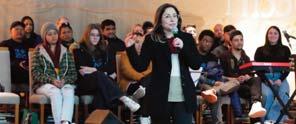
The mission agency of the Convention of Evangelical Mennonite Brethren Churches in Brazil hosted an event in September—Agência
of the discourse, “those in the traditional group agreed to be more open to the moving of the Spirit, while those in the charismatic group agreed that they could be more focused on the Word,” Duck says. Unity within the church was maintained peacefully, based on coming together around God’s Word, with openness to continually revising understandings.
Today, COBIM counts about 8,000 members in more than 90 congregations, provides services to neighbors locally and sends mission workers into the Amazon, northern Brazil, Angola and other countries in Africa where Portuguese is spoken.
PRAYER REQUESTS:
• Pray for the expansion of the MB church into all regions in Brazil, especially the most unreached areas in the country, like the Amazon and northeast.
• Pray for outreach to all Portuguese speaking countries.
• Pray for many new leaders, as mission work expands and new churches are planted.
• Pray for strengthening the discipleship process of each church member, transforming them into multipliers. We were born to reproduce.
• Pray that each member will have a strong biblical foundation.
• The Brazilian mens soccer team has won the World Cup a record five times.
• Brazil is the largest country in the Southern Hemisphere and is 50 percent of South America’s landmass.
Peace is central to the ministry
By Larry Nikkel
Just over a decade ago, the U.S. Conference Board of Faith and Life (BFL) initiated a process of reviewing Article 13: Love and Nonresistance of our Confession of Faith. This article dealt primarily with a Christian’s participation in violence and war. It was reviewed at least in part because many perceived it as too radical, and it was no longer taught or preached in our churches. Pastors were told unofficially that they would not be forced to preach Article 13 but were forbidden to speak against it.
The article, speaking against all forms of violence, had always suffered from a lack of compliance. For example, 31.5 percent of Mennonite Brethren men entered military service in World War II as combatants instead of accepting other options available to them that did not require combat, reports Paul Toews in his book Mennonites in American Society, 1930-1970. This was true for other Mennonite groups as well.
BFL members traveled across the country meeting with churches and church leaders, testing the pulse of the constituency’s response to proposed revisions to Article 13. As a result of these meetings, BFL revised the article and broadened the peace mandate to include peacemaking in our homes, churches, communities and around the world.
The proposed article, renamed “Love, Peacemaking and Reconciliation,” was approved overwhelmingly at the 2014 national convention. It provided an opportunity for U.S. Mennonite Brethren to embrace a comprehensive approach to Jesus’ plea for unity, the core of which is peace.
We hoped that revising Article 13 would move us forward together, bridging the differences between us. That we, as a denomination, would have integrity with our stated commitment to a peace-seeking, peace-making, peacekeeping agenda. It is my impression, not supported by data, that the revision of Article 13 has in fact had little effect on our congregations and constituency.
And so, I invite us to commit ourselves to being vigilant in matching what we do with what we say we believe (James 2:17) and prioritizing Jesus’ commitment to peacemaking. Patrick Henry is reported to have said that “eternal vigilance is the price of liberty.” It could also be said that eternal vigilance is the price of theological integrity.
Peace is central to the ministry of Jesus. His passion is seen in his prayer just before his crucifixion when he pleads for the unity of the church for one critical reason: that “the world will believe that you sent me” (John 17:21). The unity for which Jesus prays is a recurring theme of his ministry.
Earlier in John, Jesus introduces a new mandate that serves as the centerpiece for the unity for which he prays: “A new command I give you, love one another. As I have loved you, so must you love one another” (John 13:34). Our discipleship is built on the foundation of love.
We live in a deeply fractured society. A society whose values and actions easily draw our attention away from being serious Jesus followers in favor of political and social action. One such distraction is the way politics has infiltrated both our lives and the life of the church to the degree that our primary allegiance to Jesus is almost indistinguishable from our allegiance to our government. Politics, by its very nature, is divisive and creates winners and losers. When we get overly attached to one political party or another, we tend to lose our objectivity
and find ourselves behaving as though one party is always right and the other is always wrong. We would do well to focus more on what is right than on who is right. What is right? That in all things, we attempt to follow the example of Jesus.
When Jesus arrived on the scene, he found the Jewish people in a terrible situation, living under the oppressive rule of the great Roman Empire. The Jews were eagerly awaiting the coming of a Messiah who would free them from this oppression. So how much time does Jesus spend confronting the Romans about their atrocities? Zero. It’s not that he didn’t care. It’s just that it was not his agenda. Jesus couldn’t afford to get distracted by the political situation of his day and neither should we.
Another area that can lead to distraction and disunity is our tendency to be critical and judgmental. In the Sermon on the Mount, Jesus says, “Do not judge” (Matthew 7:1-5, Luke 6:37). Judging others is not unifying; it divides. Seldom are we in a position of knowing fully the circumstances under which others are living.
Instead of judging others, we are called to love one another. In I Corinthians 13 the apostle Paul says, “And now three things remain: faith, hope, and love; but the greatest of these is love.” Love is the antidote for jealousy, discrimination and other attitudes that lead to creating emotional distance between us and others.
Rick Warren got it right when he opened his book The Purpose Driven Church with the words, “It isn’t about you.” When we in the church quibble over things of secondary importance, we violate our commitment to love each other as brothers and sisters in Christ. We embarrass ourselves in the eyes of the community, and we rob ourselves of joy and peace.
Our commitment to peacemaking does not mean we will somehow avoid conflict. Perhaps the biggest “peace buster” I’ve experienced in my lifetime is the way some responded to the shift in our style of church worship music, going from a traditional to a more contemporary style. Many were quick to judge the faith of others based on their music preferences. An extreme example occurred when a church custodian confronted a college student who played the drums in a recently formed “praise band.” The college student was taken aback and said, “I’m just trying to serve my God.” The custodian responded, “Then you serve a different God than I do.”
While weathering disagreements about worship style has not been easy, many of us agree that worship style is a secondary issue. There continue to be positions taken that threaten to divide Christians—for instance, views about gun control, the role of women in church and other debatable issues. For some of us these are secondary issues and for others they are primary. We are told to stand firm in our convictions on these and

We live in a deeply fractured society. A society whose values and actions easily draw our attention away from being serious Jesus followers....
other issues to the point that I’ve heard some say that those who disagree with their view aren’t “true” Christians.
Being peacemakers means we will work through differences that can create conflict and division. Article 13 calls us to “actively pursue peace.” Many times, we know what to do to pursue peace, but we have difficulty doing it. We need to figure out how to practice what we preach.
It is easy for us to become discouraged when we see so much pain, anger and disorganization and so little peace. There are issues that cause fear and depression, increase our anxiety and rob us of peace. While we are not expected to solve these issues, we are expected to do what we can to promote peace and love in our circles of influence.
We can demonstrate our love by writing a note, offering someone a ride or taking in a meal. We can resist the temptation to doubt one another’s faith commitment when we disagree and commit to trusting one another. Remember that what you can do is what you can do. These small actions empower us and bless others.
When we engage in these practices of loving one another non-judgmentally and serving each other with grace and humility, we are contributing in small but meaningful ways to God’s agenda of peace in the world. The apostle Paul says it this way, “Don’t get tired of doing what is good. Don’t get discouraged and give up, for we will reap a harvest of blessing at the appropriate time” (Galatians 6:9).
Larry Nikkel was the chair of the U.S. Board of Faith and Life from 2008 to 2016. He served as president of Tabor College from 1990 to 2008, with Mennonite Health Services from 1993 to 1998 and as CEO of Prairie View Hospital and Mental Health Center from 1967 to 1993. He and his wife, Elaine, live in Hesston, Kan.


Three ways in which revising Article 13 revised my thinking


Thirteenyears ago, the U.S. Conference of MB Churches (USMB) started a process that led to changing Article 13 of the Confession of Faith. At the time, the article was called “Love and Nonresistance.” It contained, among other points, this line: “In times of national conscription or war, we believe we are called to give alternative service where possible.”
The current version is called “Love, Peacemaking and Reconciliation.” It is different from the former version in significant ways. It is less explicit about the implications of a commitment to peacemaking, deleting the claim that we believe we should avoid military service (though it still reports that many of us choose to avoid it). It is also more expansive, stating clearly that a commitment to peacemaking makes us agents of reconciliation in all of life: in families, churches, communities, our nation, the whole world.
I was deeply involved in the process of changing Article 13. I was (and still am) a member of the National Board of Faith and Life (BFL) that led the process. I consulted with MB leaders in the U.S. and around the globe and with international representatives of Mennonite World Conference. I was one of the plenary speakers at the study conference where the key issues were discussed. I was a participant in meetings with district faith and life boards. I contributed to various proposed drafts of the new article and to the final decision-making process where the new Article 13 was adopted.
Allow me to reflect on how I experienced this whole process and how it helped shape my own convictions:
• about whose Confession of Faith this really is;
• about what I should do with my own convictions;
• and about what matters more than agreeing on a definition of peacemaking.
I’ve changed my mind on all these issues!
The idea of revising Article 13 was considered by the Board of Faith and Life even before the 2010 USMB National Convention that really got the ball rolling. There we documented what we all knew: Many Mennonite Brethren were convinced Article 13 should be revised.

By Tim Geddert
At the time I was adamantly opposed to the idea. I was among those convinced that the traditional Peace Church stance on military (non-)participation faithfully represents what Christian discipleship implies. I knew I was in the minority among faithful Bible interpreters, perhaps even among U.S. Mennonite Brethren. But that was my conviction, and so I assumed it was my duty to oppose any attempt to revise the Confession of Faith.
When we “discovered” (wrongly, it eventually turned out) that the U.S. would not be able to change the Confession of Faith without the Canadian Conference of MB Churches agreeing to the same change, I inwardly rejoiced, thinking: That kills the idea. The Canadians will never agree to the change we were contemplating. Our Confession of Faith will continue to declare that we do not participate in the military. Yay!
But I changed my mind. No, I did not change my mind on my basic convictions about what peacemaking means. I changed my mind about whose viewpoint the Confession of Faith should reflect. I had previously assumed I should try to get the Confession of Faith to say whatever I believed. I no longer believe that. The Confession of Faith should represent “our shared” beliefs, not “my personal” beliefs. If “we” cannot credibly claim that “we” believe something, then we should stop saying we do. Our integrity as a confessional body is at stake. Besides, the whole Confession of Faith becomes quite meaningless if everyone gets to decide which article they want to asterisk and say, “That one doesn’t matter.”
Along the way I discovered that many Anabaptist leaders were alarmed at what we were proposing. How could one national MB Conference delete from its Confession of Faith a core conviction that had always been present in every confessional document of every other historic Peace Church? I remember difficult conversations with key Anabaptist leaders. Some of them were adamant: “The Confession of Faith must stay as it is. Your mission, Tim, should be to try to get people to believe what the Confession of Faith says, not to help change its claim to match what people believe.” That used to seem obvious to me as well. But I changed my mind. I guess on this matter I had changed my mind a long time ago. We claim so easily that our biblical and theological duty is to try our best to get everyone to believe as we do. Really? Bearing witness to our convictions is often appropriate. But is it really our responsibility to try to get everyone else
to agree with whatever we believe? (If you are married, don’t assume that this is how you should always treat your spouse!)
If we exclude from our faith communities all who don’t see eye to eye with us on a whole host of topics, we will perhaps be able to create insolated and isolated communities of like-minded people, but at what cost? We need to listen to and learn from each other, honor sincerely held beliefs that are different from our own and model for the world a core Christian conviction: Unity does not require uniformity.
One final important point. The new version of Article 13 has the potential to rally us together around some of the core components of the Christian faith. All believers can and should be able to confess with us: “God in Christ reconciles people to himself and to one another, making peace through the cross.” Surely all followers of Jesus can boldly profess: “We actively pursue peace and reconciliation in all relationships by following Christ’s example and his command to love God, neighbors and even enemies. We strive to be peacemakers and agents of reconciliation in families, churches, communities in our nation, and throughout the world.”
Peacemaking is not only the topic of Article 13. Peacemaking characterized the entire process of revising it! We are peacemakers as we listen to each other, explore shared convictions, publicly declare what we can honestly say we agree on. The very wording of the new version of Article 13 is the result of a reconciling, peace-promoting process of overcoming differences in order to reach a strong consensus that promotes peace.
I used to believe that almost nothing was as important as arguing for “the peace position” that I personally believe is the right one.
But I changed my mind! In our hyper-polarized world, where culture wars and political strife are tearing the country apart, often ripping apart families and churches along the way, there is a more pressing Christian priority than arguing for a particular definition of peacemaking. And that is modeling peacemaking, as we provide a radically loving, reconciling and peaceable alternative to the polarization of the world around us. The new version of Article 13 calls us to this radical alternative.
Tim Geddert is professor of New Testament at Fresno Pacific Biblical Seminary in Fresno, Calif. He is a member of the U.S. Conference Board of Faith and Life.
“Blessed are the peacemakers, for they will be called children of God,” Jesus says in Matthew 5:9. Why is being a peacemaker so important?
Peacemakers are not just those who have been taught to avoid conflicts but are those who step between warring parties to initiate reconciliation. They are committed to moving forward.
Being a peacemaker shows we are part of God’s family, a family with shared values and priorities.
Peacemaking means we are willing to do what it takes to improve relationships, not just stop conflicts. We can destroy barriers that are in our control.
Peacemakers move wisely to keep building truth for the good in all areas.
Peacemaking takes time, effort, prayer and the right attitude and spirit. It’s about being deliberate and building consistently, resulting in trustworthiness. Here are three reminders for peacemakers.
We are pilgrims passing through. This is not our home. I Peter 2:11 reminds us we are pilgrims: “Beloved, I beg you as sojourners and pilgrims, abstain from fleshly lusts which war against the soul” (NKJV).
Our country is heavenly, and we cannot let ourselves get entangled here on earth. We are not to waste our skills on earthly desires and neglect our salvation. Fleshly lusts will always try to draw us away because of our fallen nature.

“Blessed are the peacemakers, for they will be called children of God.”
“Mark the perfect man and behold the upright.”

Keeping our focus on what truly matters, we are to be examples and a model others can follow. We are to be God-seekers and God-pleasers. Because we are engaged in a spiritual battle, conflicts will arise and attacks will be inflicted in order to bring ruin and captivity. As strangers and pilgrims, the only conflict we must endure should be that of the lusts that war against our souls and not the conflict of those that surround us inside and outside of our churches.
Peacemakers operate from their set of values and beliefs. “Mark the perfect man and behold the upright: for the end of that man is peace,” (Psalm 37:37). Psalm 37 describes a person who is perfect in soul because he or she has been saved from their sins and now has God’s love and image. This person is upright in conduct, and at the end of their time, they will be at peace, quiet and assured forever. The Psalm 37 individual is a peacemaker, constantly building, working and trying to solve problems, putting out fires. He or she is a great helper, most likely the best volunteer on the team because whenever this individual is involved the team is winning, moving forward and succeeding.


Pastors of congregations highly value this type of individual and desire to have them as part of their team. These individuals operate out of conviction, integrity, honor and experience. They are principle oriented.
Peacemakers are morally pure, peaceable, gentle, open to reason, full of mercy and patient. They bear good fruit and are willing to go the extra mile.
Peacemakers work at developing these skills:
• Conflict resolution
• Creative problem solving
• Effective communication
• Negotiation
• Persuasion
• Strategic thinking
• Leading change
• De-escalating
Peacemakers always take the way of escape. “No temptation has overtaken you except what is common to mankind, and God is faithful; he will not let you be tempted beyond what you can bear. But when you are tempted, he will also provide a way out so that you can endure it” (I Corinthians 10:13).
Shortly after getting on the highway, we encountered between 80 and 100 individuals riding four-wheel and three-wheel motor bikes as well as small jeeps. In just a matter of seconds, they took over the highway, stopping and blocking all traffic.
I knew instantly that trouble surrounded us. These people were openly carrying weapons of all types— firearms, baseball bats and hammers—and had loud music playing. I told the brother riding with me to start praying as I carefully navigated from the middle lane to the shoulder lane to try to get away. The troublemakers were hitting cars, assaulting people and robbing them. My opportunity became a choice. I could have opted to use force, but conviction told me to flee, which became my way of escape. Peacemakers always have a choice, and one choice is to honor God.
On another occasion, my wife and I were in our backyard late one afternoon. I was showing her the budding herb and vegetable garden I had planted ear-

“No temptation has overtaken you except what is common to mankind...”
God provides the way of escape so we can endure whatever temptation to pursue conflict, argument or confrontation that comes our way. We need to look for the way out (escape) from that temptation. Remember, God is faithful. This means God gives us sufficient strength to resist. This is a promise; he will provide the way out of that problem.
Conflict happens, whether in the church or workplace, with a neighbor or family member. As members of God’s family, we are to pray and find a diplomatic solution to a problem. As a pastor, many times I had to clothe myself with humility (Colossians 3:12-14) to diffuse potential problems.
As a concealed carry holder and firearms instructor who is well trained and knowledgeable in the profession, I’ve had my share of situations where defending myself would have been justified, the law favoring my cause of defense, but I sought the opportunity of escape.
One night one of the brothers in my church and I were driving to an office building. To provide for ministry, our church had contracted to clean this building.
lier that spring. Suddenly, two men drove up in a truck and were walking up the driveway. They tried to open our fence, but it was locked from the inside.
When I asked what they wanted, they said they were here to repair my roof and windows. They also said they had been at our house the day before. Walking toward them, I commanded them to stop, telling them they were mistaken and had the wrong house.
As I got closer to them, I could smell liquor. It was apparent that they had been drinking. One had a long bar in his hand and the other held a hammer. When my wife asked me if she should call 911, I instructed her not to—yet. They continued to try to open the fence, even after I gave them warnings not to.

As I more sternly warned them to stop, the men said they needed to talk to us inside the house. I began to back away, keeping my eyes closely fixed on them as my wife now called 911. When I couldn’t back away anymore because my vehicle was behind me, I lifted my shirt and drew my conceal carry firearm. I didn’t
point it at them but held it close to my side. This was the last warning.
The two men were about 20 feet from me, and because of my training, I knew they could reach me in less than two seconds given the distance. I was inwardly praying the whole time. Then one of them said, “Hey stop. He has a gun.” Immediately, they jumped in their vehicle and left the scene. The police arrived after they left.
This was the right choice—my way of escape. My wife and I did not become victims, nor did I make the men victims.

ple, even family members, who have become victims of an act of violence. But I want to remind us that we live by another set of rules. As Christians and disciples of the Lord Jesus Christ, we should take the higher road whenever we can. Psalm 34:14 says, “Turn away from evil and do good; seek peace and pursue it.”
“Turn away from evil and do good...seek peace and pursue it.”
We hear or see some form of violence or conflict every place we turn. We know of peo-
Robert Mendoza is a pastor with Victory Outreach. He and his wife, Genevieve, attend New Life Community, a USMB church in Dinuba, Calif. Mendoza is a concealcarry and church safety instructor.
It’s been almost a decade since we U.S. Mennonite Brethren revised Confession of Faith Article 13 on peacemaking. The last sentence of Article 13 says, “Because Jesus is Lord, his example and teaching take priority….” This emphasis on Jesus as our example for peacemaking is reinforced by the authors of the feature articles in this issue. Five articles comprise this collection—three are in print and online while others are online only.
Read more online
• “Worth it” by Adam Miller
• “Guided by Christ” by Aaron Garza
God’s community of peace
We believe that God in Christ reconciles people to himself and to one another, making peace through the cross. The church is the fellowship of redeemed people living by love. The bond between followers of Jesus transcends all racial, social and national barriers.
Christian peacemaking
We actively pursue peace and reconciliation in all relationships by following Christ’s example and his command to love God, neighbors and even enemies. We strive to be peacemakers and agents of reconciliation in families, churches, communities, in our nation and throughout the world.
As peacemakers we alleviate suffering, reduce strife, promote justice and work to end violence and war, that others may see a demonstration of Christ’s love. As in other Peace Churches many of us choose not to participate in the military, but rather in alternative forms of service.
Because Jesus is Lord, his example and teaching take priority over nationalism and the demands of human authorities.
Exodus 20:1-17; Jeremiah 29:7; Matthew 5:9, 17-26, 38-48; Romans 12:9-21, 13:8-10; 2 Corinthians 5:15-20; Ephesians 2:14-18; I Peter 2:19-23
Losing legs brings change of heart
Iwasborn into a Christian family that went to church every time the doors were open. For years I was a good little boy. When I got into junior high and high school, I slowly drifted as Satan lured me with temptations. My language got worse, and I started drinking and doing drugs. In the 1980s, I began lifting weights and replaced recreational drugs with steroids. The phase my parents thought I would outgrow turned into a lifestyle.
My life went along like this for 13 years. During those years, I sustained injuries requiring surgery, my mom died and my wife had a miscarriage. I quit smoking, but I still drank. I was arrogant and belligerent and fighting at home seemed constant. I felt the Holy Spirit trying to get me to turn my life around, but I was in my 20’s and had plenty of time to change.
But when God has a plan for your life and you’re not living up to it, God has a way of getting your attention.
By this time, I was working for the Sedgwick County Fire Department. On Nov. 1, 1989, at 2:15 p.m., we got an alarm for a grass fire. Smoke completely covered the roadway, so we drove slowly through the smoke to make sure no
vehicles were on that section of the road. Then my partner, Stew, got out of the truck to handle the hose while I drove the truck. But because of the smoke, I couldn’t see Stew in the truck mirrors, so I got out of the truck to tell him to yell or bang on the truck when he wanted to move.
As I walked out of the ditch, a lady in a baby blue Ford Tempo driving 55 miles per hour pinned me between the front of her car and the back of Engine 2. The impact moved a 26,000-pound truck 22 feet and crushed my legs into the Tempo’s grill like a bug. I fell face down on the concrete, knocked out of my bunker boots. The pain was unbearable, but I didn’t black out. As I hit the ground, I prayed for the first time in 13 years. “Lord, please let me live long enough to see my little girl grow up.” I was flown by helicopter to the hospital in critical condition.
The first surgery lasted 13 hours. My legs had been shattered from my ankles to above my knees. Because the bleeding would not stop, I had another 4-hour surgery, and I lost both legs above the knee. The doctor told me that my heart had stopped for four and a half minutes during my first surgery. I made one of those “foxhole conversion” promises: “Lord, if you let me live through this, I'll walk the straight and narrow. I promise I'll change my ways.”
I thought of the unconfessed sin in my life and couldn’t believe how far I had strayed from God’s path. The road to destruction had happened one step at a time. Even though I had abandoned God, God never abandoned me. The
Holy Spirit had gone to every party and every bar and heard all the dirty jokes, bad language and fights, patiently waiting for me to come back.
I can’t believe it took getting pinned between vehicles to wake me up. I’m not saying God throws cars at people, but God will use terrible things to produce good things. God had a job for me, and he knew I didn’t need my legs to do it. It’s too bad it took something as drastic as losing my legs to get my attention. Is God trying to get your attention? Are you listening? One Sunday, I came across a church service on TV where a guest speaker with cerebral palsy gave a sermon, “Thou shalt not bellyache.” The next week, his sermon was, “Don’t ask why, ask what.” God was trying to tell me something. When I went to get prosthetic legs, I met a man who had lost both arms, legs, ears and most of his nose to frostbite. He never complained about a rough
See Testimony, page 30

Roger Dakin is a 65-year-old medically-retired firefighter. He and his wife, Kathy, have been married for 43 years. He attends Ridgepoint Church, Wichita, Kan.
Howshould Christians celebrate Halloween? Halloween can be confusing for Christians and there is a broad spectrum of Christian responses to this holiday. I don’t think there is one right answer, but I’d like to share a few ideas from our family and other Bethany Church families.
Our street knows we trick-ortreat in the daylight so they’re all ready for us around 5 p.m. We take our time visiting with neighbors, and we usually stay on our street of 22 houses. That’s plenty of candy for us. Then we head home for the real fun.
The pumpkin chili simmering in the crock pot is served around our dining room table with our grandparents and a few neighbors. When the doorbell rings, we’re thrilled to greet our trick-ortreaters. Since our fall yard décor includes white twinkle lights, cute pumpkins and happy homemade scarecrows, children of all ages feel safe coming to our door. We make it our business to be as kind, well-lit and hospitable as possible. We want to be the house that everyone wants to visit!
One church family hands out small Bibles or storybook Bibles to trick-or-treaters. Another sits out on their bright front porch with a bowl of candy to pass out as they watch the parade of cos-
tumes. One couple brings their lawn chairs and fire pit to their front driveway to greet passing neighbors. Another family uses Halloween as a night to spend time at home together. They bake cookies and put on a family movie or play board games. They turn out lights in the front of the house so trick-or-treaters get the polite message to move along.
The apostle Paul reminds us in 1 Thess. 5:5, “You are children of the light and children of the day. We do not belong to the night and to the darkness.” As children of light, let’s avoid decorating our yards with gory, violent content that not only invites demonic activity but also disturbs and upsets others. Halloween can be a very scary time of year for some children so let’s not contribute to fear and evil. In Kids Church, we encourage each other to look for Jesus instead of looking at scary stuff, asking, “What can I find right now that reminds me of Jesus? The clouds! That tree with the fall colors! Wind blowing the leaves!”
Two years ago, we started a new tradition with the Bethany Church children. We send the children home with a roll of tape and a sandwich bag full of Bible verses printed on small papers. The children tape the Bible verses to each piece of candy their family will give trick-ortreaters. (If you want to join us in this tradition, I suggest that you give great candy.) Here’s why we enjoy this so much: Remember what God says about his Word in Isaiah 55:11: “It will not return to me empty but will accomplish what I desire and achieve the purpose for which I
sent it.”
Someone will read that Bible verse, and God will work in their life. Maybe multiple someones! I can’t wait for the moment in heaven when someone joyfully runs up to a Bethany Church child to say, “Thanks for that Bible verse you put on your Halloween candy! That was a turning point for me!”
So, do we celebrate Halloween? I wouldn’t say we “celebrate” it. Do we take advantage of the opportunity to connect with our neighbors? Yes. Do we use the opportunity to share God’s love with the world around us? Yes. Do we shine the light of Jesus brightly as children of light? Yes!
The apostle Paul reminds us in 1 Thess. 5:5, “You are children of the light and children of the day. We do not belong to the night and to the darkness.”

Crystal Nachtigall is honored to be the Children’s Pastor at Bethany Church in Fresno, Calif.
got questions
standing column
Howmany hearts does an octopus have? Who was the first woman to win a Nobel Prize? What is the world’s smallest country?
We live in the age of trivia. From pub quiz nights to elementary spelling bees, we in North America like to ask one-response questions related to all aspects of life. Our culture puts great importance in knowing the answer and relaying it quickly. People get rewarded for memorizing sports statistics, the correct spelling of scientific words and the names of all the extended relatives in Jane Austen novels. We, in turn, learn random information over a broad selection of topics and hope someone will ask us the specific dimensions of the Tabernacle altar.
Here lies the problem: most of the questions being asked within our faith communities are not trivial. On top of that, many of these inquiries don’t boil down to a single answer. These complicated questions can’t always be answered like Jeopardy. (“What is five cubits by three cubits.”) Instead, they require prayerful consideration, deeper conversation and a willingness to come to a different conclusion than what was expected. In other words, we are looking for wisdom.
Theologian Peter Enns states it well in his book How the Bible Actually Works, “Seeking wisdom rather than grabbing for answers is what this life of faith is about.” But what does it look like to seek wisdom?
Jesus is asked a lot of questions
by a lot of people in the Gospels, most of them grabbing for answers. On one such occasion recorded in Luke 10:25-37 (NLT), an expert in the law—someone whose job it is to know answers—sets up a pop quiz for Jesus. He asks, “What should I do to inherit eternal life?”
Jesus does not respond with the quick, correct answer but poses his own inquiry. “What does the law of Moses say? How do you read it?”
Reciting the Torah, the man replies, “‘You must love the Lord your God with all your heart, all your soul, all your strength and all your mind’; and, ‘Love your neighbor as yourself.’”
Jesus acknowledges the man grabbed the correct answer. The expert does in fact know his law. The man continues. He is seeking wisdom when he asks Jesus his next question, “And who is my neighbor?”
Again, Jesus foregoes a quick answer and responds instead with a story. He tells about a traveler, beaten and left on the side of the road, who encounters three people walking that way. Two people ignore the man in peril; one—“a despised Samaritan”— stops and provides care. The expert listens as Jesus expands the common definition of neighbor. The expert is given something even better than an easy answer; he is given the chance to discern and to find wisdom. And that is true for all of us who are following Jesus.
As we take time to sit with questions and resist the temptation to
immediately respond with trivial answers, may we seek God’s wisdom and experience joy in the process. Scripture encourages us forward, reminding readers, “Happy is the person who finds wisdom and gains understanding.” (Prov. 3:13)
What questions are being asked in your church community right now? How are you seeking God’s wisdom? I would love to hear more about your experience. Send me an e-mail at gotquestions@usmb.org
In case you need them for your next trivia night: three, Marie Curie and Vatican City.
Most of the questions being asked within our faith communities are not trivial.

Friesen, a graduate of Fresno Pacific Biblical Seminary, is married to Ben Friesen and is part of Cornerstone Community Church in Topeka, Kan.
The MB church in DR Congo offers holistic help to displaced people
Thesurvivors came with burns, machete wounds and babies about to be born. They were exhausted after walking for weeks or months without much food or water. They carried emotional wounds from watching family members and neighbors massacred in front of them.
Ever since 2017 when survivors of brutal fighting in the Kasai region of the Democratic Republic of the Congo fled to the city of Kikwit, the Communauté des Eglises de Frères Mennonites au Congo (CEFMC, Mennonite Brethren Church of Congo), based in Kikwit, has been ministering to them with faith and action.
Individuals welcomed people into their homes and offered clothing and food. The CEFMC hospital staff provided medical care and their churches became temporary shelters. When the needs proved greater than CEFMC could meet alone, Mennonite Central Committee worked with the local CEFMC committee to empower displaced people.
The church is called to meet the holistic needs of its people, says Antoine Kimbila, CEFMC general secretary. When a person’s spiritual and physical needs are met, they are more likely to experience peace.
“Peace is a synonym of shalom,” he says. “When we say shalom in Hebrew, it is the total salvation of mankind. What (MCC) brings to us in the community as projects … when it is married with the word of Christ, that brings peace to humankind.”
But peace didn’t come to Kikwit immediately. The arrival of displaced people caused conflict, says Jacqueline Kafuti, who was the first CEFMC

elder to invite people to live in her home. Other neighbors hosted people from Kasai too, she says, but there were those who pushed the newcomers aside because resources were already limited.
In addition, some displaced people acted out because of the trauma they had experienced, says Kufutama Kafaire, another CEFMC local committee member.
“Someone who runs away, is displaced because of war, his head is troubled,” Kafaire said. “It looks as if the war has been following him even where he is.”
Providing equal education was one way that CEFMC helped to strengthen the connection between the two groups. By giving school supplies to primary school students and paying secondary school fees for displaced teens, the burden on host families was lifted. CEFMC also provided trauma training for the teachers.
Colette Koy Mazao, whose sixthgrade class doubled in size with the arrival of displaced children, struggled at first because displaced children self-segregated in the back of
the classroom and did not speak the local language of Kikongo or the academic language of French.
Some displaced children were violent. Others would sometimes cry when she called on them. When she asked why, they told her, “We are thinking about the situation that we have passed through.”
Through the training, Mazao and other teachers learned the importance of mixing students in the classroom instead of allowing them to sit in separate groups. Teachers organized outside activities so that students from both groups would be on the same teams.
In the classroom, Mazao learned to pay more attention to the emotional needs of the displaced children by drawing them aside when they looked upset. If a student is absent often or sick, she visits the student’s family to see if there is a problem she can help to resolve.
Mazao also learned to be less serious in the classroom and joke with the children. “It has helped not only the displaced children, but all the pupils to live in peace with everybody,” she says.
She’s happy that this year one of the displaced children in her classroom is at the top of the class academically. He also helps monitor the classroom behavior when she is absent.
“Things didn’t change so quickly,” Mazao says. “We worked progressively. Now there is a change.”
At the CEFMC hospital in the Kanzombi neighborhood, staff struggled initially with the behavior of people who were displaced. Dr. Jacques Tangudiki, a CEFMC local committee member responsible for health care, says displaced people demanded to be treated first and tended to be violent and noncompliant with treatment. This created tension between nurses and patients.
“Imagine your father was murdered in front of you; your mother was raped in front of you,” Tangudiki says. “They were living with all of this.” Sometimes they would express anger when there didn’t seem to be a reason for it.
Tangudiki says the nurses have learned to understand this trauma response and how to help people deal with their emotions through the trauma training MCC provided. The hospital also provides primary care to displaced people for free, including disease prevention and medication for common ailments, such as malaria and waterborne diseases.
As a result of all the peacemaking work, humanitarian and spiritual, displaced people are gradually settling into life in Kikwit.
“Since they came here, they completely lacked a lot of things, but now they have first the joy because many have become members of our church, an important step,” Kimbila says. “Because they are at our side, they feel there are people who love them, with whom they can live.”—
Linda Espenshade





• One-of-a-kind online program can be completed in one year
• Grounded in current neuroscience and psychology research
esear chology r d psy
xamined thr sonalfaithise

• Personal faith is examined through the lens of neuroscience
• The latest in Trauma-Informed education
ren ounded in cur ed y complet ind pr of-a-k - e euroscienc duca er E ough esearch oscience t neur en ear am can ogr tion ucation
rauma-I in T osciencneur or.edu/m r. ttab auma-Informed oscience .edu/med
Morethan 330 high school students, youth leaders and staff converged on Glorieta, N.M., June 16-20 for USMB
NextGen’s third annual national high school camp, ASCENT. Students represented 19 churches from California, Kansas, Minnesota, Nebraska, Oklahoma and Utah.
ASCENT’s mission is to connect high school students from across the country while providing each with the opportunity to encounter a lifetransforming, personal connection with Jesus.
Sessions focus on “BE”
This year’s theme, BE, addressed culture’s obsession with and definitions of achievement, success and productivity.
Jason Quiring, pastor at Greenhouse Community Church in Saratoga Springs, Utah, urged students to live countercultural lives. In four sessions, Quiring encouraged students to “BE in Christ” (2 Corinthians 5:14-21), “BE still and know” (Psalm 46:10), “BE transformed (Romans 12:1-2) and “BE salty and lit”
(Matthew 5:13-16).
Student Zaylee Werth from Parkview MB Church in Hillsboro, Kan., says the Psalm 46:10 message was meaningful.
“What I learned from camp is to ‘be still,’” Werth says. “It is okay to not be going all the time, (and) the Lord is more worried about our heart and our relationship with him than what we are doing. He isn’t going to love us more or less based off of what we do.”
Each session began with games led by emcees Kyle Goings, Ridgepoint Church, Wichita, Kan., and Mike Klaassen, Parkview, to welcome and engage students. Presence Worship from Newton, Kan., led worship through music.
The final evening of camp, Stephen Humber and Joanna Chapa, members of Multiply’s Midwest Regional Mobilizers Team, hosted a night of worship and learning about missions.
Partner agencies Multiply, Fresno Pacific University, FaithFront, Mennonite Central Committee and Tabor College connected with students.
For the first time, FaithFront, a student leadership program housed at Tabor College, offered a pre-camp, “Encounter” experience. Encounter is FaithFront’s advanced-level program designed to provide a mobile lab in which students experientially encounter global issues that call for Christian action. Seven students from Kansas and California traveled from Tabor’s campus to Garden City, Kan., to engage in a conversation about refugees before heading to ASCENT. Participants received a $100 scholarship for ASCENT. Also new was a learning opportunity, “The Exchange.” Students who chose not to go whitewater rafting attended this informal session where speaker Quiring and Multiply’s Chapa answered the question, “Are members of The Church of Jesus Christ of Latter-day Saints and the Catholic Church Christian?” Quiring and Chapa gave background on each faith tradition’s beliefs and practices and shared their personal experiences of doing life with people who consider themselves members of

each group. This session concluded with students texting questions to the speakers.
Joel Newton, Greenhouse, says camp was an invitation for action.
“Camp was one of the best experiences of my life,” Newton says. “I left challenged to share my faith with my LDS family and friends back home.”
Students chose two workshops to attend. The hour-long classroom-like settings allowed students to engage in topics including: what does it mean to deconstruct my faith, understanding and engaging fear, evangelism, creating ways to remember, identity and understanding how culture impacts our lives.
Mackenzie Hagerman, North Oak Community Church, Hays, Kan., says the workshop on identity left a lasting impact.
“I learned to take my thoughts captive and reaffirm who God made me to be in respect to how I view my identity,” Hagerman says.
Students also experienced a unique avenue of learning in interactive tracks, which sought to connect students’ hobbies and interests to the everyday kingdom of God. These included advanced hiking, mountain stroll, writing and journaling, painting and art, photography, rock stacking, video games, basketball, disc golf and kickball.
Before breakfast each morning, students and staff could attend a Bible study, “J-Time,” short for “Jesus Time,” led by Multiply’s Humber and two senior students from North Oak Community Church, Hays, Kan. Every day, campers had free time to participate in activities such as arrow tag, swimming, hiking, sand
volleyball, tree rappelling, drift trikes, zip line, mini golf, disc golf, a super swing and more.
Daily group events helped foster community between churches. These events included a silent disco, talent show, mud pits and Rally Games. Rally Games are a simple way for people to get to know each other. Campers and staff were randomly put into different teams to compete against each other in a variety of activities.
For many campers, ASCENT was more than just a break in their daily
routine. It was an opportunity to learn and take steps forward in their spiritual journey.
Lola Eppright, Ridgepoint Church, Wichita, Kan., says camp was a starting point.
“This year especially, a greater need was put on actually being in the presence of God and spending time in the Word,’” Eppright says.
Finding the sacred in the ordinary impacted Hazel Jerez, from Lighthouse Community Church, in Wichita, Kan.
“I now look at salt differently, as I remember what it means to ‘Be like salt,’” Jerez says.—Michael Klaassen

are brewing over cups of coffee as women visit local coffee shops in northern Wisconsin—all because one woman listened to a whisper to show up.
Dena Sensenig had an idea for a coffee-related gathering after hearing about a coffee crawl in Detroit Lakes, Minn. At the time, Sensenig was attending a retreat with five women from her church, Sand Lake Chapel in Stone Lake, Wis., and others, including sister MB church Exeland (Wis.) Mennonite Church.
The crawl consisted of multiple stops in one day, and Sensenig knew she couldn’t handle that many cups of coffee in 24 hours. But, inspired by retreat speaker Taunya Todd, Sensenig sensed a nudge to show up for her own community. As she and the other women returned from the retreat, they devised a plan to visit 12 locally run coffee shops in 12 months.
With that, the Talkee Coffee Club was born.
Stone Lake is an unincorporated town in Wisconsin’s Northwoods, an area with forests, rivers and lakes popular with tourists and for outdoor recreation. Stone Lake does have a coffee shop, and the women, from various churches and the community, began their adventure at The Whistle Punk in November 2022. Friendships developed as the dozen women chatted for a few hours over cups of coffee.
The club has met the first Saturday of each month since at different coffee shops within an hour’s drive for most women. Often, they head west to Spooner, a town of about 3,000 people.
“It’s amazing how many little coffee shops are out there when you look for them,” Sensenig says. “We want to support the local coffee shops to show them they are seen, and we appreciate them so much.”
Talkee Coffee’s motto is “Be Seen, Be Known, Belong.” In a Facebook group, Sensenig invites the women to share prayer requests.
“How many times do we try to blend into our surroundings and hide what’s really happening inside?” Sensenig says in an email interview. “We want to see people who need us to show up for them. We also need to allow ourselves to be seen by others. Then as the friendship grows, you get to know each other. This part can be done by living wholeheartedly, with God-confidence. Last, we want people to be-
long and know there is a place where they are always welcome. Ultimately, this would be the family of Jesus.”
As relationships bloomed and conversations deepened, the women began incorporating activities like shopping or planting flowers at a greenhouse after their coffee gathering.
The women have personalized mugs and “passport shirts” with logos of the coffee shops they visit, a perk of Sensenig’s and her mother’s crafting hobby. Sensenig requests permission from shop owners to use their logos, and this has led to relationships as well.
“I have more community connections, not just the ladies from Talkee Coffee but (also) my connection with the owners,” Sensenig says. “They

are people, too. I normally would have placed my order and walked away when it was filled. Now I stand there and have conversations with the owners or employees.”
Because of its success in filling hearts as much as cups, Talkee Coffee is expected to continue beyond 12 months.
“While the group itself has been very consistent with 12-16 ladies coming each month, the connection is much larger with the potential of growing every month,” Sensenig says. “I hope that women go home with their hearts filled and their energy for their lives renewed. I hope they look forward to Talkee Coffee as much as I do for the friendship.”
According to Anna Hochstetler, Sensenig’s mother and another of the club’s founders, Talkee Coffee offers rich intergenerational relationships.
“I see Talkee Coffee as a way to help women of many ages to see each other in a new light as we reach into the communities around us,” Hochstetler says. “Ages of the ladies who are coming range from 15 to over 70. I definitely hear people listening and offering ideas, encouragement, prayers and sometimes answers to each other. I find it being a little deeper and more open each time.”
Verena Beckel, another initial member, notes the importance of community.
“In a world that is busy and stressful, Talkee Coffee is a place to sit and relax,” Beckel says. “A place where each woman is special and important. If it matters to you it matters to me because no one should do life alone. I love each Talkee Coffee meeting because for a few hours I
am surrounded by women who I know love me just as I am and don’t want me to feel alone.”
As Sensenig has poured into the club, Talkee Coffee has provided new friendships, purpose and confidence.
“I was a stay-at-home lonely mama, (and) now I have a monthly gathering of close friends I didn’t know more than as an acquaintance or not at all before,” she says. “I feel supported and pray they do, too. It all started with a whisper or nudging to show up.” —Janae Rempel
Sand Lake Chapel isn’t the only USMB congregation that brews min-
istry along with coffee. Read our online stories about Pine Acres Church and The Bridge Bible Church at https://christianleadermag.com/ category/news/














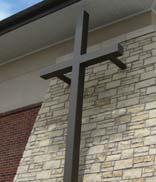
info@mbfoundation.com www.mbfoundation.com
City Church participates in local chile festival to engage community
Ajalapenoeating contest may not seem like a typical church outreach event, but for members of City Church in Pueblo, Colo., it is a perfect way to engage with their city.
Pueblo puts on an annual Chile and Frijoles Festival each September to “promote Pueblo’s rich agriculture,” according to the festival’s website. The city is known for its particular variety of green chiles.
The three-day event, which features live entertainment, street vendors, hot air balloons and cooking competitions, more than doubles Pueblo’s population of a little over 110,000 people.
City Church pastor Mario Trujillo says that the festival is just one of many opportunities the church takes to meet people, build relationships and engage in gospel conversations.
“We look at it as a rhythm of the city that we participate in, in order to engage the community with the gospel,” Trujillo says. “Jesus, in every aspect, met people where they were at.”
City Church was planted in 2017, and Mario and his wife, Stephanie, have been leading the church since the following year. They are both natives of Pueblo, a blue-collar community known as the “Steel City.”
“The city is pretty blanketed with religiosity, but also the crime is pretty high,” Trujillo says. “I was born and raised here, so I’ve seen the beauty of the city; I’ve also participated and been part of the brokenness of the city, and I just see its need for the gospel.”
The church is located in downtown Pueblo where the festival is held. Volunteers from the church take shifts manning a tent outside the building which gives them an opportunity to

talk to festival goers walking by and invite them to participate in jalapeno eating contests held throughout the day. Participants are challenged to eat seven varieties of jalapeno peppers from least to most spicy to win gift cards of up to $300.
“We try to do it very generously,” Trujillo says.
Trujillo emphasizes the church’s desire to be active in the community and make connections with locals, as he sees many people in the city longing for a sense of community. Even if the connections made during the festival begin on a surface level, they are still extremely valuable because building trust is paramount.
“You have to earn their trust; they don’t start to participate with anything unless they trust you and you’re for the city,” says Trujillo. “There have been conversations that have
gone deeper, and we’ve been able to share the gospel with people that have walked by, and also pray for people.”
City Church’s efforts to build rapport in Pueblo reach beyond their activities during the Chile and Frijoles Festival. They use the building’s downtown location to serve the city in a variety of ways, allowing the space to be used for school fundraisers, outdoor concerts, food truck vendors and for partnering with local small businesses.
Trujillo says these activities “equip the church to be able to engage and live on mission with Jesus.”
“That’s basically the heart behind it—to have the church engage the city as opposed to just being here on a Sunday,” he says. “These are opportunities we have to love our city well.”—Jessica Vix Allen
Greenhouse Church, Axiom Church mark 10-year anniversaries
Overthe past three decades, USMB has employed some type of national church planting initiative that has produced considerable fruit. Mission USA was a particular focus of USMB from 1996 to 2016. During those two decades, Mission USA operated alongside district church planting boards and committees to plant many now-thriving Mennonite Brethren churches. Two of these Mission USA backed churches, Greenhouse Church in Utah and Axiom Church in Arizona, recently celebrated their 10-year anniversaries.
Jason and Nicole Quiring were lead planters and continue as the lead pastoral couple for Greenhouse Church in Saratoga Springs, a community that had never previously seen an effective evangelical church. Eleven people made up the first congregation in a city and surrounding area that is predominantly Mormon. Over the past 10 years God has opened opportunities for Greenhouse to put down deep roots within the city.
The Quirings determined to lay a foundation of trust with the community, especially in light of the primarily Mormon culture that is often leery of evangelical Christianity. Greenhouse applied a more organic, missional, relational approach which is slower growing but has been a good fit for the area.
“We have always prayed God would only grow us as fast as we are healthy and we believe he has done just that,” Nicole says. “We funnel everything through our mission to love God, love people and serve the world.”
For the anniversary celebration July 30, the church celebrated in a local city park with a concert, free
food, games and incredible fireworks. “Those fireworks were so symbolic to God’s faithfulness these last 10 years but also a shoutout about his work for all the valley to see,” the Quirings say. “The power and beauty of the fireworks was a
lumberyard building and refurbished it for worship. A well-known coffee shop, Driftwood, is attached and is part of the overall outreach plan, being instrumental in bringing recognition and people to Axiom. Now quite well known in Peoria,
During those two decades, Mission USA operated alongside district church planting boards and committees to plant many now-thriving Mennonite Brethren churches.
display of God relentlessly pursuing each one of us.”
Great things appear to be on the horizon for the next 10 years as well.
Axiom Church in Peoria began with church planters Gavin and Nicole Linderman and Gavin’s brother, Lance, and was birthed from a singles/young marrieds group out of mother church, Copper Hills Church, a 1996 Mission USA church plant. From the beginning the vision was to plant a church that was enmeshed within the community, with integration into the life of the community through many special events and active service. However, the search for initial meeting space was a major hurdle. Rental facility prices were extremely high.
Axiom finally located a space that had previously been a small gym/dance studio and retrofitted it. As Axiom quickly grew, that facility soon became obsolete, and in 2018, Axiom purchased an old
Axiom continues to grow with the largest attending age group being young families. Thus, a new kids’ facility is next on the priority list.
Axiom celebrated its 10-year anniversary Aug. 6, with a special evening including a catered meal, linen tablecloths, a humorous “roasting” of the church staff by two elders and much music. Lance and Gavin told the story of the church’s history, showing pictures and a video which emotionally portrayed God’s faithfulness over the church’s first decade. Axiom is ready for the “future church.” With much anticipation, the church talked expectantly about what God would do in the future.
“We plan to keep doing what we’ve been doing, preaching the gospel in Peoria,” Gavin said. “Reaching people who need Jesus and being a light in our community.” —USMB news story
Compiled by Janae Rempel
Baptism/Memberships
Steve Theilen, Rita Sparvell, Tim Blair, Amber Blair, Willa Blair, Landyn Dillman, Kerrington Dillman, Leila Cook, Aspen Nasr, Mandy May and Jackie Edwards were baptized at Stony Brook Church, Omaha, Neb., July 23.
Daniel Keller, Justice Woodward and Oakley Dutton were baptized at South Mountain Community Church, South Jordan (Utah) Campus July 2. Ashley Howland and Jered Holdaway were baptized June 25. Jared Bosworth, Mason Bosworth, Dionne Ekenstam, Teresa Sunderland, Olivia Sunderland, Paul Sunderland, Ty Baker, Eric Provolt, Jamie Provolt, Grace Glenn, Dayne Gyll, Mack Gyll, Paisley Hanley, Audriana Beach, Nora Allred, Emma Erickson, Sadie Guiterrez, Clara Guiterrez, Hunter Walden, Robby Russo, Chris Bambrough, Marina Normando, Devin Heins, Siena Wanless, Ian Kennedy, Dean Kennedy, Christie Wiscovitch and Jason Wiscovitch were baptized at the Draper (Utah) Campus June 25. Rich Stone and Mayley Madrigal were baptized June 18. Alan Madrigal was baptized at the St. George (Utah) Campus June 23.
Jay Darling was baptized and received as a member at Bethesda Church, Huron, S.D., June 25. Mackenzie Copeland was also received as a member.
Paul Romero, Evelyn Romero, Marianna Zetino and Ryan Zetino were baptized June 25 at New Life Community, Dinuba, Calif.
Kathy Krontz, Cassandra McBeth, Keith Price and Kristen Price were received June 25 as members at Buhler (Kan.) MB Church. Keith Price was also baptized.
Nick Demeny and Harry Grow were baptized at Lakeview Church, Stansbury Park (Utah) Campus June 11.
Larry Carrier, Alene Carrier, Stephen Carrier, Justin Hammer, Alex Hammer, Krista Kopper, Kyle Becerra, Alaina Becerra, Matt Wadsworth, Hannah Hiebert, Isaac Brown, Rebecca Brown, Byron Funk and Deana Funk were received as members June 11 at Community Bible Church, Olathe, Kan.
Charlie Wilson, Terri Wilson, Eddie Harrod, Jeanie Harrod, Johan Van Kesteren, Joni Van Kesteren and Patrick Simons were received as members at Good News Fellowship Church, Ferndale, Wash., June 1.
Dan and Susanna Strutz concluded their service as pastoral couple at Community Bible Church, Mountain Lake, Minn. Alex Janzen is serving as pastor.
Shaun LePage was installed July 30 as church plant pastor at Community Bible Church, Olathe, Kan. Annabel Prieb concluded her service as office manager. Karla Hiebert began serving in that role in April.
Anderson, Anita, Visalia, Calif., member of Reedley (Calif.) MB Church, Sept. 24, 1931— June 16, 2023. Parents: Ralph and Anne (Walton) Anderson. Spouse: Clifford Anderson (deceased). Children: Dorothy Crass, Brian, Terry, Elizabeth Stair; 12 grandchildren, 21 great-grandchildren.
Braun, Randall Lee, Fresno, Calif., member of Butler Church, Fresno, Dec. 29, 1957—June 26, 2023. Parents: Donald and Johanna (Krause) Braun.
Crandall, John Allen, Huron, S.D., of Bethesda Church, Huron, Feb. 3, 1960—June 14, 2023. Parents: Raymond and Julia (Haugen) Crandall. Spouse: Dawn (Molyneux) Crandall. Children: two sons. Step-children: Austyn Molyneux, Elen.
Fadenrecht, Genita Nadine, Salem, Ore., member of Kingwood Bible Church, Salem, July 12, 1936—June 9, 2023. Parents: Norman and Hilda (Koskela) Schuler. Spouse: Virgil Fadenrecht. Children: Sheryl Lehmkuhl, Doug; five grandchildren, one great-grandchild.
Friesen, Maurine Jeanette, North Newton, Kan., former member of Bethel MB Church, Yale, S.D., March 19, 1928— June 26, 2023. Parents: Joseph M. and Susie J. (Hofer) Walter. Spouse: Paul C. Friesen (deceased). Children: Mark, John, Paul, Bruce, Susette Jewell; 13 grandchildren, 11 great-grandchildren.
Jost, Karl G., Hillsboro, Kan., member of Hillsboro MB Church, Dec. 28, 1935—June 25, 2023. Parents: Peter G. and Elisabeth (Funk) Jost. Spouse: Marilyn J. Hiebert. Children: Todd, Corey, Craig; eight grandchildren, one great-grandchild.
Koop, Dave, Reedley, Calif., member of Reedley MB Church, Jan. 12, 1921—July 11, 2023. Parents: Jacob and Sarah (Fast) Koop. Spouse: Helen (Suderman) Koop (deceased). Children: Mary Kauffman, Jim, Ruth Prieb, John; eight grandchildren, 22 greatgrandchildren, seven great-greatgrandchildren.
Kroeker, Marvin Elroy, Fresno, Calif., Sept. 20, 1928— July 18, 2023. Parents: Jacob P. and Mary (Zielke) Kroeker. Spouse: Lily Ruth Siemens (deceased). Children: Bruce, Kevin, Ross; seven grandchildren, five great-grandchildren.
Schmidt, Mildred Marie, Custer, Wash., member of Good News Fellowship Church, Ferndale, Wash., May 26, 1940— June 14, 2023. Parents: Henry and Louise Friesen. Spouse: Stanley Schmidt. Children: Kathryn, Patricia, Michelle; seven grandchildren.
Voth, Mary Ann, Kremlin, Okla., member of Crosspoint Church, Enid, Okla., Jan. 23, 1934—Feb. 12, 2023. Parents: Lacy and Thelma (Morton) Sherley. Spouse: Johnny E. Voth (deceased). Children: Janet Streck, Diane Fosmire, Gary; 11 grandchildren, 14 great-grandchildren.
Wingert, Kathleen Ann, Wichita, Kan., member of Ridgepoint Church, Wichita, July 26, 1935—June 26, 2023. Parents: Ross and Maude Esther Barton. Spouse: Fred Wingert. Children: Teri, Bart, Daphne Adair, Wende Doyle; seven grandchildren.
Stony Brook Church, Omaha, Neb., hosted a panel discussion about marriage.
Bethel MB Church, Yale, S.D., held a worship theology seminar, potluck and concert July 23.
Axiom Church, Peoria, Ariz., held a marriage crash course and date night July 21 to explore how to navigate pressure points.
Neighborhood Church, Visalia, Calif., held a leadership summit exploring causes of cultural tensions and how to walk alongside someone with a different viewpoint Aug. 6 and a “Parenting in a Tech World” conversation July 9.
Ridgepoint Church, Wichita, Kan., held a building dedication
and open house Aug. 27. The PrimeTimers took a bus trip to tour the Marlin Grand home and mansion Aug. 10. The church planned a splash pad meetup for families, a young adult picnic July 18 and a family swim night July 9. The men’s ministry hosted a breakfast July 8 at SouthLife Church, Wichita.
Parkview MB Church, Hillsboro, Kan., held a family evening Aug. 14 with watermelon and yard games at the park with visiting missionaries.
Hesston (Kan.) MB Church had a back to school pool party Aug. 20.
Lincoln Glen Church, San Jose, Calif., held a block party Aug. 4 with food trucks, live music and bounce houses.
Shafter (Calif.) MB Church held a backpack trip Aug. 4-6. Women had “D-Night” each Monday in July for a devotion and dessert and hosted a bunco tournament July 20.
Heritage Bible Church, Bakersfield, Calif., women gathered for weekly fellowship and projects in July.
Bethany Church, Fresno, Calif., held a bagel brunch reception July 30 providing an opportunity for newcomers to meet church leadership.
Cross Timbers Church, Edmond, Okla., held a watermelon feed July 30.
House of the Gospel, Fresno, Calif., men went camping July 28-30.
SouthLife Church, Wichita, Kan., women enjoyed a pool party Aug. 2. The church hosted a Family Fest July 23 with inflatables, games, food and worship.
Mountain View Church, Fresno, Calif., women made arts and crafts July 26.
Mothers of preschool children from North Fresno (Calif.) Church met for pizza in the park July 25. Women had supper and
swimming July 19. People went to a Fresno Grizzlies game July 5. The church held a pancake breakfast July 2. The July 16 pop-up barbeque was rescheduled for Aug. 6.
Pine Acres Church, Weatherford, Okla., hosted a community cookout and country gospel night Aug. 6, bunco night July 30 and board game night July 23.
Axiom Church, Peoria, Ariz., hosted a young adults meetup July 18.
Hillsboro (Kan.) MB Church men hosted Golf and Grub Aug. 20 and Fish and Fry July 15.
North Oak Community Church, Hays, Kan., women had poolside refreshments July 18 and toured a farm toy museum June 24. The church held a pulled pork picnic July 2.
Ebenfeld MB Church, Hillsboro, Kan., men provided breakfast July 9.
Community Bible Church, Olathe, Kan., held a back to school bash Aug. 13 and a BBQ potluck picnic with yard games and pie eating contest July 8. Women attended theatre in the park July 20.
Cornerstone Community Church, Topeka, Kan., held a pool party Aug. 4, a coffeehouse event, book discussion and prayer activity July 21, and a July 2 dessert gathering.
Zoar MB Church, Inman, Kan., held a summer missions Sunday with three guest families and picnic-style meal July 2.
Kingwood Bible Church, Salem, Ore., met for church at the lake Aug. 6. Young adults went hiking July 2.
House of the Gospel, Fresno, Calif., enjoyed water activities July 2.
Faith Bible Church, Omaha, Neb., hosted a block party July 14, worship in the park July 9 and a cookout July 3. Men met for breakfast and delivered food
to someone in need July 1. People from Ebenfeld MB Church, Hillsboro, Kan., and Parkview MB Church, Hillsboro, Kan., shared testimonies, snacks and yard games July 9.
Summer events for adults at Bethany Church, Fresno, Calif., included bunko; painting, exercise and line dancing classes; and a day at a local range.
Churches hosted hymn sings: North Oak Community Church, Hays, Kan. Aug. 13; Shafter (Calif.) MB Church July 30; and Parkview MB Church, Hillsboro, Kan. July 16.a Cof Celebrations
The Bridge Bible Church, Bakersfield, Calif., celebrated 20 years with food trucks, bounce houses and music Aug. 6.
Axiom Church, Peoria, Ariz., celebrated 10 years with dinner and dancing Aug. 6.
Greenhouse Community Church, Saratoga Springs, Utah, celebrated its 10th anniversary July 30 with special morning and evening services to celebrate God’s faithfulness.
Community Bible Church, Olathe, Kan., held a building dedication July 30.
Ridgepoint Church, Wichita, Kan., celebrated Aroma Coffeehouse’s first birthday with AromaFest July 14, including raffle prizes, food trucks, activities and live music.
Fairview (Okla.) MB Church prepared a meal for Fairview school staff Aug. 8.
Neighborhood Church, Visalia, Calif., partnered with families by serving as Neighborhood degree mentors and lunch buddies and helping with the Houston soccer league.
Seventy children registered for vacation Bible school at Salem MB Church, Freeman, S.D. Children raised $1,274 to purchase chickens for impoverished families through Samaritan’s Purse.
Hillsboro (Kan.) MB Church served more than 200 people at their county fair supper July 19.
Parkview MB Church, Hillsboro, Kan., and Hillsboro MB Church sent people to serve at Game Changers at Greenhouse Community Church, Saratoga Springs, Utah.
Mountain View Church, Fresno, Calif., hosted three block parties in July.
People from Shafter (Calif.) MB Church sang at an assisted living facility July 19. The church held its wrestling camp July 17-21.
Ethiopian Christian Fellowship Church, Olathe, Kan., held a “July for Jesus” outreach July 4.
Axiom Church, Peoria, Ariz., held an art and Bible camp July 10-14. People met for a prayer walk July 1. The congregation gathered school supplies for teachers.
Bethel MB Church, Yale, S.D., filled 24 baby bottles for the Plus One Pregnancy Guidance Center’s fundraiser. People also assembled 27 newborn kits for MCC.
Parkview MB Church, Hillsboro, Kan., provided school supplies for Hillsboro Elementary School.
Community Bible Church, Olathe, Kan., sent a team to partner with Lakeview Church, Stansbury Park and Grantsville, Utah.
Butler Church, Fresno, Calif., hosted 40 SOAR Fresno participants in Multiply’s training program.
District Minister: The Southern District Conference is seeking a district minister (DM) to begin serving in January 2024. This a full-time employee who serves as the conference pastor and staff executive of the SDC. The DM should have significant ministry experience and a meaningful connection to the Southern District churches and will especially serve as a pastor to pastors. For more information (including job description) and/or to apply, please visit https://usmb.org/jobs/ or contact davefroese@gmail.com.
Lead Pastor: Koerner Heights Church in Newton, Kan., is searching for a lead pastor. Please find more information at koernerheights.org/employment or email frontdesk@koernerheights.org.
Lead Pastor: Pine Acres Church, Weatherford, Okla., is seeking a man to lead this growing congregation into the next phrase of God’s plan for our church. For more information and for application form visit https://www.pineacres.org/job-opportunities
Lead Pastor: Valleyview Bible Church, Cimarron, Kan., is seeking a lead pastor. We are a Christ-centered, Bible teaching church and have a multigeneration group. Potential candidates can apply at https://valleyviewbiblechurch.wordpress.com/pastoral-search/ or contact Charles Sauerwein at candc@ucom.net / text 620-272-6928 or Wayne Bartel at lynnbartel65@att.net / text 620-339-2243.
Testimony, from page 17 life. God puts people in your way for a reason. My wife, Kathy, and I started going to church, and for the next eight years I taught eighth through 12th grade Sunday school. These were the best years! I still struggle with temptation. Satan haunts me with memories of things I’ve done. When I feel guilty and unworthy of Christ’s forgiveness, I remember that my
Worship Pastor/Director: Hillsboro (Kan.) MB Church is looking for a full-time or part-time worship pastor or director. The job description is flexible depending on gifting, availability and experience. If interested, send resume and worship leading sample or link to hmbcsearchteam@gmail.com.
Worship Director: North Fresno Church, Fresno, Calif., is seeking a parttime (20 hours/week) worship director. Qualifications: BA or master’s degree in Music or Christian Ministry and more than two years of experience. For more information and to apply, visit https://northfresnochurch.org/ jobs/ Email questions to office@northfresnochurch.org
Children’s Pastor: North Fresno Church, Fresno, Calif., is searching for a fulltime Children’s Pastor. Qualifications: bachelor’s degree in child development, social sciences, liberal arts, Christian Ministry or related fields and two-plus years of experience. Send resume to ChurchStaffing.Com, North Fresno Church, Fresno, CA. Job description available upon request. Send questions to: cpsearch@northfresnochurch.org.
Family Ministries Pastor: Buhler (Kan.) MB Church is seeking a family ministries pastor to oversee ministries to children and youth (through high school). For more information (job description) and to apply please visit http://www.buhlermbchurch.org/Staff-Hire
Pastor of Student Ministries: Shafter (Calif.) MB Church is searching for a full-time pastor of student ministries to oversee junior high, high school and college ministries. A full job description and additional information is available at https:// www.shaftermb.org/psm/
worthiness did not save me, it’s Christ’s worthiness as a sacrifice that makes the difference. I lost my legs, my job and nearly my life. For 34 years, God has given me strength to handle this. God’s always with me. God didn’t just make me shorter that day. He changed me on the inside. He changed my heart and way of thinking.


Statement of ownership, management and circulation
Publication title: Christian Leader. Publication number 0009-5419. Filing date: 8/11/23. Issue frequency: bimonthly. Number of issues published annually: 6. Annual subscription prices: $10. Complete mailing address of known office of publication: PO Box 155, Hillsboro, KS. 67063. Complete mailing address of headquarter or general business office of publication: U.S. Conference of MB Churches, PO Box 20200, Wichita, KS. 67208-1200. Full names and complete mailing address of publication, editor and managing editor: Publisher: U.S. Conference of MB Churches, PO Box 20200, Wichita, KS. 67208-1200; Editor: Connie Faber, PO Box 155, Hillsboro, KS. 67063. Managing editor: none. Owner: U.S. Conference of MB Churches, PO Box 20200, Wichita, KS. 67208-1200. Known bondholders, mortgages and other security holders owning or holding 1% or more of total amount of bonds, mortgages or other securities: none. Tax status has not changed during proceeding 12 months. Issue date for circulation date: Sept/Oct 2023. Extent and nature of circulation: the first number represents the average number of copies of each issue during the proceeding 12 months, the number in parenthesis is the number of copies of a single issue (July/Aug 2023) published nearest the filing date. (a) Total number of copies: 7,715 (7,657) (b) Paid circulation: 1) mailed outside-county paid subscriptions: 6,909 (6,907) 2) mailed in-county paid subscriptions: 448 (395) 3) paid subscriptions outside the mails: 0 (0) 4) paid distribution by other classes of mail: 209(207) (c) Total paid distributions: 7,566 (7,509) (d) Free of nominal rate distribution: Outside county copies: 0 (0) Incounty copies: 0 (0) Copies mailed at other classes through USPS: 2 (5) Free or nominal rate distribution outside the mail: 2 (3) (e) Total free or nominal rate:4 (8); (f) Total distribution: 7,570 (7,517); (g) copies not distributed: 145 (140); (h) Total: 7,715 (7,657) (i) Percent paid and/or requested circulation 99.94 (98.06). 16. Electronic copy circulation: (a) paid electronic copies: 0 (0) (b) Total paid print copies + paid electronic copies: 7715 (7657) c. total print distribution + paid electronic copies: (d) 7715 (7657). (d) percent paid: 99.94 (98.06) I certify that all information furnished is true and complete I understand that anyone who furnishes false or misleading information on this form or who omits material or information requested on the form may be subject to criminal sanctions and/or civil sanctions.
Signed: Connie Faber
